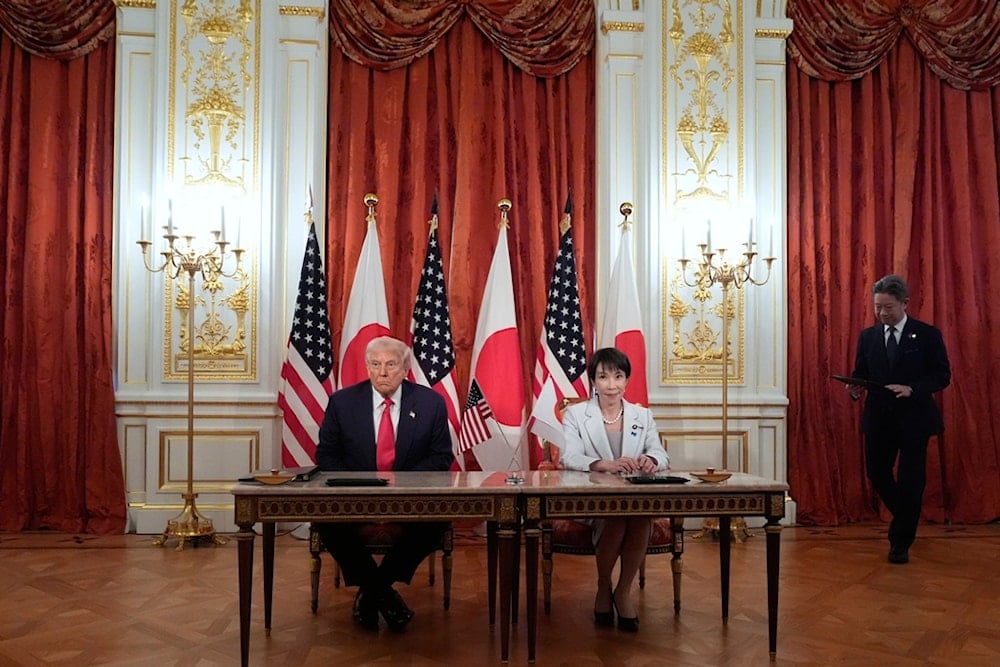Trump, Takaichi sign rare earths deal to strengthen US-Japan alliance
US President Donald Trump and Japan’s Prime Minister Sanae Takaichi signed a rare earths supply deal in Tokyo, pledging to boost the US-Japan alliance amid rising tensions with China.
-

US President Donald Trump, left, and Japan's Prime Minister Sanae Takaichi attend a signing ceremony at Akasaka Palace in Tokyo, Japan, Tuesday, October 28, 2025. (AP Photo/Mark Schiefelbein)
Japan’s new Prime Minister, Sanae Takaichi, has pledged to usher in a “golden age” for the US-Japan alliance during talks with US President Donald Trump in Tokyo. The meeting marked the second stop on Trump’s Asia tour and signaled renewed strategic and economic cooperation between Japan and the United States.
The two leaders swiftly signed an agreement aimed at securing the rare earths supply chain, a critical move following China’s recent decision to tighten export controls on minerals vital to high-tech industries.
The agreement outlines a framework for both nations to collaborate on mining, processing, and investing in rare earths and other critical minerals. A White House statement emphasized that the deal’s goal is to “assist both countries in achieving resilience and security of critical minerals and rare earths supply chains.”
The US and Japan plan to use coordinated economic policies and investments to develop diversified and fair markets for these strategic resources.
Read more: Japan learns the hard way; US alliance is conditional: WaPo
Takaichi celebrates first US visit as prime minister
In her opening remarks, Takaichi expressed optimism about the future of bilateral ties, stating, “I would like to realize a new golden age of the Japan-US alliance, where both Japan and the United States will become stronger and also more prosperous.”
Earlier in the day, the two leaders shared a light moment watching a live baseball broadcast featuring Japanese star Shohei Ohtani before sitting down for formal talks.
According to the White House, Takaichi intends to nominate Trump for the Nobel Peace Prize, recognizing his claimed role in securing ceasefires in Gaza and between Thailand and Cambodia, though analysts remain divided over the scope of his influence.
The two leaders paid tribute to Japan’s late Prime Minister Shinzo Abe, with Trump calling him a “great friend” and praising Takaichi as someone Abe “had spoken so well of” before her rise to leadership.
Their meeting took place on the same day that court hearings began for the suspect in Abe’s 2022 assassination.
Focus on trade and security
Trade and regional security dominated the closed-door discussions. Takaichi’s predecessor, Shigeru Ishiba, had previously negotiated tariff concessions in exchange for major Japanese investments in the United States economy.
Plans are underway for Japan to increase imports of US goods such as soybeans and pickup trucks as part of ongoing negotiations to deepen economic ties.
In a joint statement, the leaders reaffirmed their commitment to implementing the rare earths agreement, describing it as a step toward “strengthening economic security, promoting economic growth, and contributing to global prosperity.”
Read more: Trump secures trade, critical minerals deals at ASEAN summit
A strategic alliance for regional stability
Takaichi reaffirmed Japan’s role in promoting international peace and regional balance, calling the US-Japan security relationship the “greatest alliance in the world.”
Trump also welcomed Tokyo’s decision to purchase more US-made military equipment, stating that the two economies would engage in “a lot of trade” moving forward.
Congratulating Takaichi on becoming Japan’s first woman prime minister, Trump called her leadership a “big deal” and predicted she would become “one of the country’s greatest prime ministers.”
“Anything I can do to help Japan, we will be there,” Trump said. “You’re going to do a fantastic job, and we’re going to have a fantastic relationship.”

 4 Min Read
4 Min Read










